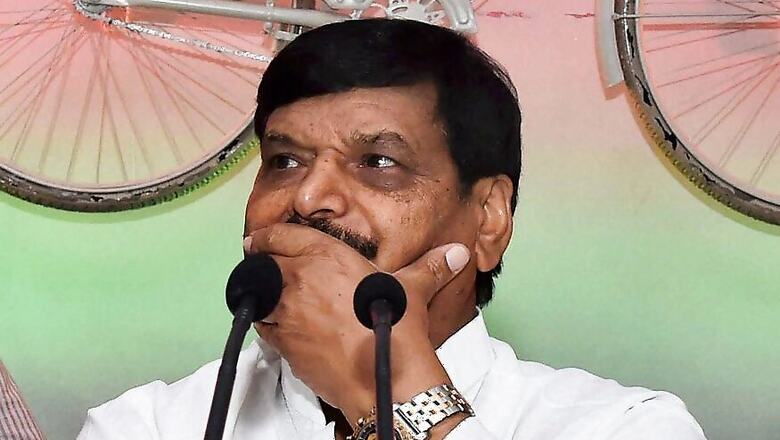
views
New Delhi: SP and BSP are counting on the anti-BJP votes for an improved showing in the upcoming Lok Sabha elections, but winning the crucial Yadav caste votes in Uttar Pradesh will also be a test for Akhilesh Yadav’s party.
Already dealing with the tough prospect of vote transfer to alliance partner BSP, the SP will also have to contend with rebel leader Shivpal Yadav, who can drive votes away from the alliance partners.
On Tuesday, Shivpal Yadav, founder of Pragatisheel Samajwadi Party (Lohia), announced a list of 31 candidates. The most noteworthy name in the list was his own as he has decided to contest from SP stronghold of Firozabad. He will take on Ram Gopal Yadav’s son Akshay Yadav, who is also the sitting MP from the constituency.
Political experts are divided on the kind of impact Shivpal Yadav can have in the election, which has seen a large number of political forces take pro or anti-Modi stand.
In the last general elections in 2014, BJP was riding high on Narendra Modi wave, and together with its allies had won 73 out of 80 seats from the state, but the SP strongholds of Mainpuri and Firozabad had remained with the party.
In the coming elections, the SP will contest 37 seats, while BSP will fight from 38 seats in UP. The RLD will be fighting on Mathura, Baghpat and Muzaffarnagar seats.
BJP Stooge?
According to Sunita Aron, journalist and author of “Akhilesh Yadav: Winds of Change”, Shivpal will take away a chunk of votes in the Yadav belt, denting the SP-BSP alliance.
“He may not win seats but he can take away a few votes. But then when it comes to a close fight, every vote matters,” she said. However, his influence is limited to a few constituencies and not across the state. The Firozabad seat will be key.
According to Aron, “BJP is using Shivpal to damage the SP-BSP alliance so it would want Shivpal to field candidates. The illicit relationship between Shivpal and BJP will be exposed in Firozabad from where Shivpal is contesting against Ram Gopal Yadav’s son.”
What Aron is waiting for is BJP to announce the candidate, “If BJP fielded a dummy, it will be clear they are together in their mission to defeat the alliance. Shivpal can’t defeat the SP-BSP alliance alone but there will definitely be a dent,” he said.
In 2014 elections, Akshay Yadav had polled 5,34,583 votes. SP Singh Baghel from BJP was the runner up with 4,20,524 votes. In 2009, Akhilesh Yadav from Congress won the seat with 2,87,011 votes. SP Singh Baghel who contested from BSP was second again with 2,19,710 votes. The candidates in Shivpal’s list has Muslims and OBCs. According to the census 2011 there Hindus 74%. Muslims 23.28%.
With the split in the party, the fear of damage to SP vote bank was expressed by Mainpuri MP Tej Pratap Singh Yadav. He is related to Mulayam Singh Yadav and married Raj Laxmi, the youngest daughter of Lalu Prasad Yadav.
He had told media in September 2018 that the rebel act of Shivpal Yadav would hurt party’s prospects in the forthcoming Lok Sabha elections. Tej Pratap reportedly said, “When a party disintegrates and a new one is formed after breaking away from the original, it definitely leaves an adverse impact. However, much will depend on candidates.”
‘Not an important player’
But political analyst Sudhir Panwar said that the mood of the election is so focused on the Prime Minister Narendra Modi that one is seen with him or against him, in this polarized election there is no chance for split in Yadav votes.
He said, “In this election there are two types of votes – for or against Modi. Shivpal’s party will have no bearing. They don’t have voter base. It is a focused election - Congress is also not getting traction in Uttar Pradesh, the smaller parties don’t really pose a challenge.”
Yadav floated the party to retain the socialist values but it is not likely have a big effect. Sanjay Kumar from CSDS said, “They are there but not in a big way. The Yadav vote bank views Akhilesh Yadav as the real leader, which has promises. The Yadav vote is largely going to stay with Samajwadi.”
But that the result will only tell. Uttar Pradesh will go through long seven-phase polling starting from 11 April 2019. The voting will end on 19 May, which is the final date of polling. The counting of votes will take place on 23 May.
While eight constituencies each will go to polls on 11 and 18 April, 10 constituencies will be voting on 23 April. On 29 April, 13 constituencies will go to polls, while 14 constituencies each will be voting on 6 and 12 May. In the final phase, 13 constituencies will go to polls.




















Comments
0 comment